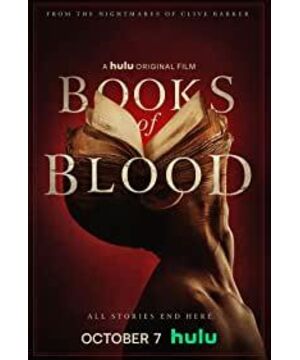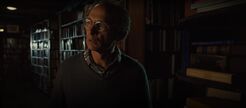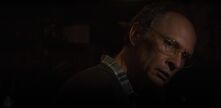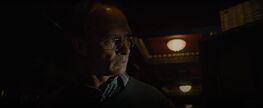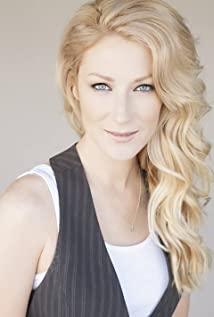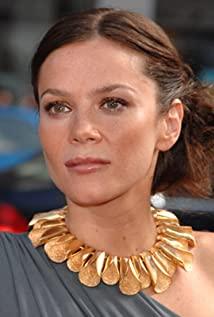Every human body is a book of blood; when we are opened, it is all red. - Clive Barker
Since the birth of writing, human history has entered a stage of writing. The contents of the writing began as mystical experiences of ancient humans communicating with the undead and the gods, which were recorded through divinations and incantations by witches and priests; then, the troubadours composed these mystical experiences into epics and ballads , passed down from generation to generation by word of mouth to the philosophical axis era in 1000 BC; the court historians of this era then edited and selected these poems and ballads and incorporated them into the social order and official history of the time. This forms the written culture and traditional values of every tribe, every ethnic group, every country. Human civilization at this time has "truth" from the state of "ignorance" that came from no beginning. The truth written through official history is justice, goodness, and light.
However, in the philosophical context of cosmology, the world of sensory phenomena is always inevitably divided into yin and yang. Official history points us to the rules, prospects, and justice of five thousand years of civilization. Let us call these truths the positive side of history; where is the negative side of history that has not been recorded and written down? "The Book of Blood" says: "Everyone's body is a book of blood; when we are opened, we are all red." This sentence means that history is hidden or covered by traditional values. In each of us, only when we show a state of openness, can this history - or this life's course and experience - be able to see the light of day again, and it may be possible for someone in the past, present and future. Bring revelation or message. The key here is what kind of state is "opened"? I can recite the language of Zen Buddhism's "Heart Sutra", that is, "The heart is free from obstacles, so there is no fear, and it is far from upside-down dreams." But Chinese language lacks tenses, so it lacks the process of reasoning logically, a lack of The conclusion of the reasoning process is actually a false consciousness, a lie.
In Buddhist philosophy, the lie is regarded as a psychological phenomenon derived from craving, attachment and ignorance, saying that it has no substance of its own because it always needs an object to be deceived. In other words, a liar is inseparable from the group, and he most needs the attention of others. People who rely on lies build a set of perceptual filters for themselves, so the lie is actually an illusion, but the liar never feels it (although he thinks he knows what he is doing). The filter of perception is usually composed of language, logic, and experience. When these three elements are dominated by social personality, that is, the "truth" or mainstream values of history, the person is in a closed state, like a book that has not been The opened book was run over by the wheel of history, which is usually called the person eaten by society. From this level, the liar is actually half-drunk and half-awake and "unintentional to do evil", just like the Monkey King in "Journey to the West" who was crushed under the Wuzhi Mountain by the Tathagata. "The crime, because the makers of the established rules, from the Jade Emperor to the Emperor Taizong of the Tang Dynasty, are all slanderous artists. Lying in a lie system is as normal and natural as eating is eating, sleeping is sleeping, and doing is doing.
The film "Blood Book" is based on lies. First of all, he set up two people who can communicate with the supernatural world, one is the scientist Mary and the other is the liar Simon, just like the witches and priests who can communicate with the undead and the unknown world in ancient times, they established a set of mutual benefits through lies Cooperative power relations. It is said that their combination is a kind of power relationship because science is the primary productive force, and it is precisely with the progress of science that human beings overcome their fear of the unknown. "The Heart Sutra of Prajna Paramita can be free of hindrance. It is also the authoritative nature of this relationship that makes their combination look like the canon and the truth as opposed to the unofficial and the fictional.
The story takes place in Ravenmoor, just like the name of the city Raven (raven) + moor (swamp), the lie partner is on the edge of the city where civilization and barbarism, science and superstition meet, It is a middle area where Yin and Yang are adjacent. The Chinese people say that people and ghosts have different paths, but what enables "all things to grow together without harming each other, and the Tao to run side by side without contradicting each other" lies in the fact that there is an honest and credible cosmic correlation order in the middle of the junction of yin and yang. Once the undead and the truth of the unknown world are suppressed, and the balance of the universe is destroyed, there will definitely be red fog and yellow clouds in the distance, and a group of demons will come. Just like the city of Ravenmoor in the film, it was split into two parts, light and dark; and Simon the liar was surrounded by angry undead with their names engraved on his body. This plot is reminiscent of the graffiti train from the black area to the white area in "Hip-Hop Storm/Style Wars 1983". Those black graffiti artists who were forgotten in the slums called themselves writers and painted them on the subway. The graffiti on it is called the signature (name), and this swaying train heading for the city center is called the yin and yang message (The Message) because the body is painted with names from the "unknown world". This The Message is: "the movement of the opposite". That is, the truth of history tends to break into a well-ordered civilization like a runaway train. Coincidentally, the liar Simon fabricated information about the underworld in the form of graffiti, and as a means of punishing him, the undead made a collective signature performance art on his body. In addition, Clive Barker's "Blood Book" happened to be published in 1984 when hip-hop culture shocked the world. It must be said that this ghost story has a social realistic moral.
The pseudo-scientist of the power class represents the past tense of history, and the present tense of the film is narrated by a college student who fears reality, Jenna, and Bennett, the collector of the underground society. They represent the middle and lower classes of society, respectively. Although Jenna, who studies philosophy, and Bennett, the underworld, are in two worlds, what they have in common is that they both believe that "life is a lie". Faced with the law of existence of lies, Jenna is sensitive and full of control; Bennett is desperate and does not know how to retreat. Bennett, the underworld, regards lies as a shortcut to get out of the bottom. After tricking the debtor into providing clues to make money, he killed him without keeping his promise. Unexpectedly, the debtor also gave him a clue of lies, and finally strayed into Raven Moore ( Ravenmoor City's Dead Zone. And Jenna, a college student, amplifies her hostility to her surroundings because she cannot feel safe in a family that lacks love. Because there are feelings of likes and dislikes that interfere with her judgment, her eyes, ears, nose, tongue, body and other sensory consciousness are always in a state of anxiety, which is shown in the film as "misophonia", which is the fear of sudden Noise, which also represents an imbalance in the established canonical order. Because traditional values have shaped the family ethics relationship too well, it highlights that the real single-parent family life is like a scam, a mass of noise that is incompatible with the harmonious family order. Therefore, although she can see through the lack of love in the family because her family has been immersed in the system of lies for too long, she does not have the courage to face an imperfect family, nor does she have the patience to think about the causes and consequences of the impact of the system of lies on family relationships. , mistakenly took the out-of-context conclusion of "eternal nothingness" as a shortcut to liberation and freedom, and even used this false concept to trick his boyfriend into committing suicide by jumping off a building. Love is also the "noise" that permeates the order of official history and the balance of the universe. Thinking about Feng Menglong's writing "The History of Love", he also wanted to fight the ruthless era with "true feelings", although his language has not yet departed from the category of the elite culture of the academy.
Jenna in the film is indeed pursuing "freedom", but she runs away with the family's money instead of choosing to work independently to support herself. After leaving home, she first found a homestay by searching for go n sleep (short for "sleep delay"). This Sleeping House is a state of absolute stillness implied by eternal nothingness. Because Jenna can't stand any noise beyond the absolute order, she can only immerse herself completely in the order to avoid any possible imbalance. This bed and breakfast, which symbolizes the delay of sleep, is Jenna's safe fortress against the eyes of others, like the tall and solid city wall of Templar Count Dracula, which is filled with the severed heads of the Huns and Tatars. The owner of the homestay is a retired nurse who is good at taking care of people and a carpenter. "Carpenter" in ancient times means "coffin maker"; while the nurse's second occupation is a gardener, and her methods of caring for people all come from her planting Lesson: Pull out the weeds. Weeds, like noise, are the dark side of an established order. For society, it is an individual who has not been integrated into the general pattern of the big era; for an individual, it destroys the senses of the eyes, ears, nose, tongue, and body that are pure in the heart. Therefore, although Jenna once again saw through the lie that the B&B is a coffin shop, and expressed fear and resistance to the "plant" people who gouged out their eyes and pulled out their tongues, but because she and Sleeping House have a common goal - eternal nothingness - So she finally chose fate and voluntarily slept in the coffin that symbolized the system of lies. As mentioned above, people who rely on lies use lies to build a set of perceptual filters for themselves, and they are unaware of their upside-down dreams.
The key to the hard-to-see upside-down dream is that she is wrapped in the sugar coat of affection. In the three stories that echo from the beginning to the end, whether it is No. 47 Torrington Avenue at the junction of Yin and Yang, or The Garden B&B, which symbolizes the sleep delay, they are two buildings full of "love". Here, there are two grieving mothers who have lost their children, one is a scientist Mary and the other is a retired nurse. Scientist Mary passed on her love for her deceased son to the liar Simon. At first, because Simon could bring the "news" of the undead son, he gained spiritual comfort by trusting Simon; after discovering Simon's lies, he did not drive him away, Instead, he used the wrath of the undead to keep Simon forever at 47 Torrington Avenue. The undead was engraved in blood on the liar Simon, just like the punishment of the queen to the emperor in court politics. In this cruel corporal flogging, there is a Love sugar coats desire and control. The retired nurse passed on her love for her deceased son to every sentient being "destined" with her, at first the unbearable patients in the hospital, then her own daughter and granddaughter, and then everyone who came to the Garden B&B. The lodging travelers, the way she loves them is by turning them into carefree "plants" that weeds out for them - like Jenna gets rid of the father who harassed her boyfriend, and the uninvited guests who break into the lodging. Bennett, the accountant, who is omniscient and omnipotent, provides them with food and daily care, and wholeheartedly builds the B&B into a quiet and peaceful dream home. This home is the result of the hard work of a nurse and gardener, where any emergencies have been ruled out, and everything is no longer impermanent, but into eternal freedom according to the established goals. And she has a natural division of labor and cooperation with Mary, the "mother" who lives at 47 Torrington Avenue. One is the reader of the blood book, and the other is the guardian of order.
Mom, who frequently appears in the film, is no longer the meaning of the old lady, but "the Virgin", although she appears in front of the audience in the image of the dark side of the "Bible" in "The Book of Blood". At this time, the protagonists of the three stories are truly connected. The director uses Mary the scientist, Jenna the philosopher, and Bennett the jungler as three characters who run through the dark side of history, and witness the subtle relationship between No. 47 Torrington Avenue, which symbolizes hell and paradise, and the Garden B&B through their bizarre experiences. As Clive Barker said, when we are opened, how can we know that there is no truth in the world of chaotic forces?
View more about Books of Blood reviews


